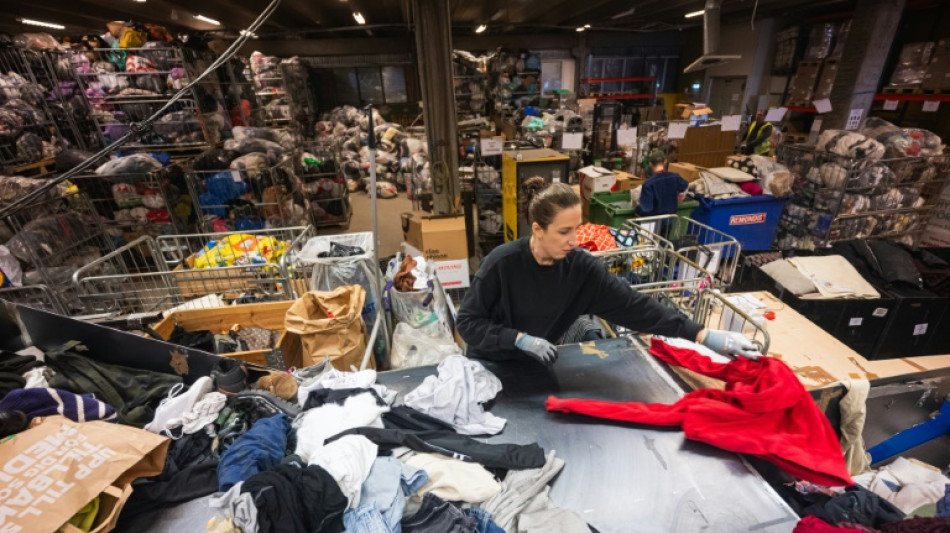
-
 SFWJ / Medcana Announces Strategic Expansion Into Australia With Acquisition of Cannabis Import and Distribution Licenses
SFWJ / Medcana Announces Strategic Expansion Into Australia With Acquisition of Cannabis Import and Distribution Licenses
-
Maresca confident he will survive Chelsea slump

-
 Mob beats to death man from persecuted Pakistan minority
Mob beats to death man from persecuted Pakistan minority
-
Lebanon says one killed in Israeli strike near Sidon

-
 Arsenal's Havertz could return for Champions League final
Arsenal's Havertz could return for Champions League final
-
US officials split on Ukraine truce prospects

-
 Client brain-dead after Paris cryotherapy session goes wrong
Client brain-dead after Paris cryotherapy session goes wrong
-
Flick demands answers from La Liga for 'joke' schedule

-
 'Maddest game' sums up Man Utd career for Maguire
'Maddest game' sums up Man Utd career for Maguire
-
Trial opens for students, journalists over Istanbul protests

-
 Gaza rescuers say Israeli strikes kill 24 after Hamas rejects truce proposal
Gaza rescuers say Israeli strikes kill 24 after Hamas rejects truce proposal
-
'Really stuck': Ukraine's EU accession drive stumbles

-
 'Not the time to discuss future', says Alonso amid Real Madrid links
'Not the time to discuss future', says Alonso amid Real Madrid links
-
74 killed in deadliest US attack on Yemen, Huthis say

-
 Southgate's ex-assistant Holland fired by Japan's Yokohama
Southgate's ex-assistant Holland fired by Japan's Yokohama
-
Vance meets Meloni in Rome before Easter at the Vatican

-
 Ryan Gosling to star in new 'Star Wars' film
Ryan Gosling to star in new 'Star Wars' film
-
Hamas calls for pressure to end Israel's aid block on Gaza

-
 Russia says Ukraine energy truce over, US mulls peace talks exit
Russia says Ukraine energy truce over, US mulls peace talks exit
-
58 killed in deadliest US strike on Yemen, Huthis say

-
 Museums rethink how the Holocaust should be shown
Museums rethink how the Holocaust should be shown
-
Three dead after deadly spring storm wreaks havoc in the Alps

-
 No need for big changes at Liverpool, says Slot
No need for big changes at Liverpool, says Slot
-
Bloody Philippine passion play sees final performance of veteran 'Jesus'

-
 New US envoy prays, delivers Trump 'peace' message at Western Wall
New US envoy prays, delivers Trump 'peace' message at Western Wall
-
Postecoglou sticking around 'a little longer' as Spurs show fight in Frankfurt

-
 US threatens to withdraw from Ukraine talks if no progress
US threatens to withdraw from Ukraine talks if no progress
-
Tears and defiance in Sumy as Russia batters Ukraine border city

-
 Russia rains missiles on Ukraine as US mulls ending truce efforts
Russia rains missiles on Ukraine as US mulls ending truce efforts
-
Tokyo leads gains in most Asian markets on trade deal hopes

-
 Two missing after deadly spring snowstorm wreaks havoc in the Alps
Two missing after deadly spring snowstorm wreaks havoc in the Alps
-
'War has taken everything': AFP reporter returns home to Khartoum

-
 US strikes on Yemen fuel port kill 38, Huthis say
US strikes on Yemen fuel port kill 38, Huthis say
-
Slegers targets Lyon scalp in pursuit of Arsenal European glory

-
 'Defend ourselves': Refugee girls in Kenya find strength in taekwondo
'Defend ourselves': Refugee girls in Kenya find strength in taekwondo
-
China's manufacturing backbone feels Trump trade war pinch

-
 Sri Lankans throng to Kandy for rare display of Buddhist relic
Sri Lankans throng to Kandy for rare display of Buddhist relic
-
Chinese vent anger at Trump's trade war with memes, mockery

-
 Heartbroken Brits abandon pets as living costs bite
Heartbroken Brits abandon pets as living costs bite
-
Mongolian LGBTQ youth fight for recognition through music, comedy

-
 Cash crunch leaves Syrians queueing for hours to collect salaries
Cash crunch leaves Syrians queueing for hours to collect salaries
-
Lyon left to regroup for Champions League bid after painful European exit

-
 Unravelling Real Madrid face Athletic Bilbao Liga test
Unravelling Real Madrid face Athletic Bilbao Liga test
-
Napoli disturbing buoyant Inter's peace in Serie A Easter bonanza

-
 Disappointed Dortmund chase consistency with Europe at stake
Disappointed Dortmund chase consistency with Europe at stake
-
Asian markets mixed as traders track tariff talks

-
 Yan and Buhai share lead at LA Championship
Yan and Buhai share lead at LA Championship
-
Under fire at debate, Canada PM Carney tries to focus on Trump

-
 Liverpool poised for Premier League coronation, Leicester, Ipswich for relegation
Liverpool poised for Premier League coronation, Leicester, Ipswich for relegation
-
India's elephant warning system tackles deadly conflict


Sweden drowns in discarded fast fashion items
Sweden's recycling centres are overflowing with clothes after an EU-wide ban this year on throwing away textiles, leaving overwhelmed municipalities eager to have fast fashion giants take responsibility.
"It's a huge amount coming in everyday. It's been crazy, it's a huge increase," said Brian Kelly, secretary general of the Artikel2 charity shop in Stockholm, where rows of bins were overfilled with discarded apparel.
Since the beginning of this year, EU countries must have separate textile recycling, alongside existing processes for glass, paper and food waste.
The aim is to promote circular waste management, where textiles are sorted and reused, or recycled if they are not too damaged.
"We have seen a 60-percent increase in textiles collected in January and February this year compared with the same period last year," said Karin Sundin, an expert on textile waste at Stockholm city's waste and recycling management company Stockholm Vatten och Avfall.
Once the textiles are sorted, some 60 to 70 percent is designated for reuse, and 20 to 30 percent for recycling as padding, isolation or composite materials.
Around seven to 10 percent is burned for energy, according to the Swedish Environmental Protection Agency.
That is a huge improvement from before the new law, according to experts, who note that discarded clothing used to be systematically incinerated.
- Large volumes -
However, a lack of infrastructure in Sweden means used clothes are largely exported abroad, primarily to Lithuania, where they are sorted, reused, or burned for energy.
"We don't have the big sorting plants that can put everything into value in the same way that they have in eastern Europe for example," explained Sundin.
"The reason is that it's so labour intensive (and) costs a lot of money," she said as she gave AFP a tour of the Ostberga recycling centre in southern Stockholm.
Swedes throw away 90,000 tonnes of textiles per year, or 10 kilogrammes (22 pounds) per person, according to the Swedish Society for the Conservation of Nature.
The EU average is 19 kilogrammes, according to 2022 statistics, up from 17 in 2019, data from the European Environment Agency showed.
The clothing industry also pollutes the environment.
To make a t-shirt that weighs 135 grammes (4.76 ounces), 2,500 litres (660 gallons) of water and one kilogramme (2.2 pounds) of chemicals are needed, noted Yvonne Augustsson, advisor at the Swedish Environmental Protection Agency.
"That means greenhouse gas emissions of around two to five kilos," she said.
"In Sweden, an article of clothing is used on average 30 times. If you double this to 60 times -- which seems reasonable -- you reduce the climate impact by half," she said.
Textile sorting in Sweden is handled by municipalities, many of which have been overburdened by the quantities received since the introduction of the new law.
In the sparsely populated north, some towns, such as Kiruna, continue to incinerate textiles because they have no takers for the items.
Fast fashion giants, such as H&M and Zara, are expected to eventually play a role in handling the waste they help generate, and negotiations are ongoing at the European level to determine their responsibility.
According to a preliminary agreement EU member states reached in February, clothing giants will be responsible for the end of lifetime of the products they sell, required to pay for collection, sorting, reuse and recycling.
- Change of attitude -
The idea is to encourage fast fashion retailers to produce "clothing designed to last longer," said Augustsson.
Swedish brand H&M told AFP it welcomed moves in that direction.
Consumers also need to change their mindset.
Each person should "buy no more than five new articles of clothing per year," said Beatrice Rindevall, head of the Swedish Society for the Conservation of Nature, which regularly organises clothing swaps.
In the town of Linkoping on a sunny spring day, a clothing exchange on a student campus had racks featuring everything from a hot pink jacket with feathered sleeves to faded jeans, bags and striped t-shirts.
"People can give us clothes in good condition that they don't wear anymore (and) exchange them for something else," volunteer Eva Vollmer said.
"We focus on creating the solution so that people actually have an alternative."
P.Costa--AMWN